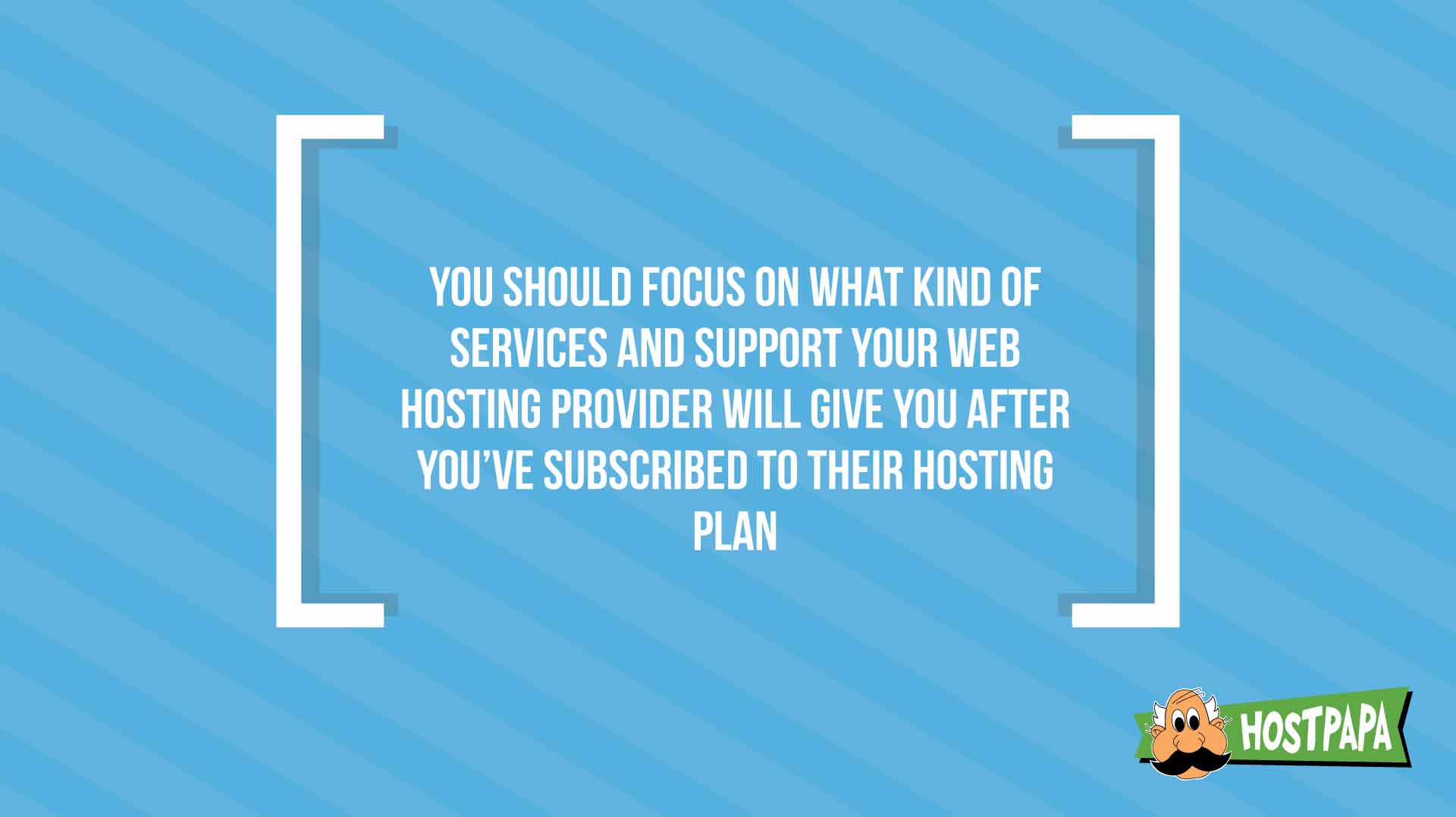If you want people to visit your website, it needs to be hosted on the internet. A web hosting provider will do this for you. As it becomes their job to get your website online, choosing a good web hosting provider is extremely important.
In this article, we’ll discuss:
- What exactly does a web hosting provider give you;
- How to choose the perfect web hosting plan for your business website;
- The must-have features you should look out for in a web hosting provider.
To get started, let’s take a brief look at what exactly web hosting providers do. Knowing this will help you better understand the different features they provide (which we will also cover).
What Does a Web Hosting Provider Do for You?
The main job of a web hosting provider is to get your website live on the internet so that people can access it.
For this purpose, a web hosting provider will give you three main things:
- Domain: The domain is your website’s address that people type in their browser to go to your website. For example, https://www.hostpapa.com/ a domain name people can use to access our website. Your hosting provider will let you choose a domain name for your website and let you know if it’s already taken.
- Server: The server is the machine which hosts your website live on the internet. It’s also responsible for supporting the traffic coming into your website. Your hosting provider will ‘host’ your website on one of their servers, so people can access it through the internet.
- Storage Space: Your website will have text, images, videos and other media files along with the code. Your hosting provider will give you dedicated space, where you can store all of your website’s code and media files.
This is the basic functionality every single web hosting provider offers. A domain (which is like a street address), a server (a place where your website can live and people can come to visit) and a storage space (room for your website’s files).
In addition to these three basic functionalities, web hosting providers offer additional features as well. In the next section, we’ll take a look at what these different features are, so it is easy for you to decide which hosting plan you need for your website.

Choosing a Web Hosting Plan That’s Perfect for Your Website
Your web hosting provider will give you different options when you go to them for web hosting.
Shared or dedicated servers? Managed or private hosting? Single or Wildcard SSL? Linux or Windows? These different technical terms might confuse you, making it hard to identify which plan is a perfect fit for your website.
But worry not, because, in this section, we’ll show you how to make different important decisions when it comes to choosing a web hosting plan.
Decision No. 1: What Kind of Hosting Do You Need?
Like we explained above, your web hosting provider will give you a server where your website will live. But you’ll have to choose what kind of server you want your website on: A shared server or a virtual private server (VPS)?
Here’s the difference between the two:
Shared Hosting
- In a shared hosting environment, your website ‘lives’ with other websites on the same server. Here, the server’s resources such as RAM, disk space, processor are shared by the websites living on that server.
- Hosting your website on a shared server is the most affordable option. It’s a great choice if your website is just starting off, and you don’t have a lot of visitors. That’s because you don’t need a lot of disk space or bandwidth that high-traffic sites need.
- If you’re looking for extra security, our Linux hosting might be exactly what you need. Linux hosting is generally considered the most secure option, as far as the operating system goes.
- If your website gets a lot of traffic (or regular spikes of it), you shouldn’t opt for this type of hosting. That’s because, since your website is on a shared server, a high amount of traffic might not be supported due to limited resources.
Virtual Private Server Hosting
- In a virtual private hosting environment, your website ‘lives’ in the same server as other websites, but in an isolated environment. You get dedicated processing power, RAM and disk space that other websites on that server cannot use.
- This type of hosting costs more. But you get more power, which means your website can handle significantly more traffic and process more user requests. If you have a well established business and anticipate a lot of traffic, get VPS for hosting your website.
- If your website is mainly an information site or won’t get a lot of visitors, this type of hosting isn’t recommended. That’s because if you get low traffic, your resources will go to waste.
Keeping these points in mind, it’s up to you choose what kind of hosting you need. If your website gets a few thousand visitors, you’ll probably do well with shared hosting. But if your website gets hundreds of thousands or millions of visitors, VPS hosting is the way to go.

Decision No. 2: SSL Security or No Security?
In this area, there is no debate. Of course you need SSL security for your website.
SSL certificate will encrypt your website and customer data, and make sure no outside hacker can steal it. This is especially useful if you operate a website, where customers are required to enter sensitive data, such as email, credit card numbers and their home address.
Here’s what an SSL certificate does:
- Encrypts any data that flows between your website and the visitors. This means hackers can’t see what information is being exchanged between your website and its visitors.
- Puts up a green padlock on the visitors’ browsers when they come to your website. This shows them your website is secure and increases their trust that you’re a legitimate business. In addition, your domain name will start with an ‘https:\\’ instead of the regular ‘http:\\’.
- If you add an SSL certificate to your website, Google will rank you higher on their search engine. This makes SSL beneficial from an SEO perspective as well.
There are two kinds of SSL certificates: SSL and Wildcard SSL.
The difference between the two, is that a wildcard SSL lets you secure multiple websites, while the normal one lets you secure a single website.
So, if you have just one website, get a regular SSL certificate. But, if you have (or plan to have) more than one websites, get a wildcard SSL certificate. This will let you secure all current and future websites under your ownership.
Decision No. 3: What Resources Do You Need?
The final thing you need to decide when getting a hosting plan is how much resources do you need.
This is a fairly simple step which requires you to answer a few questions like:
- How many professional email addresses you need that end with @yourwebsitename.com? This depends on how many workers within your company require this kind of professional email.
- How much disk space do you need? This depends on how much media elements are on your website. The more pictures, videos, and files that are on your website, the more disk space you need.
- How much bandwidth do you need? This depends on the traffic you receive. If your website gets a lot of visitors, or constantly crashes, you need to upgrade your bandwidth.
Once you answer these questions, it will become easy for you to choose which hosting plan you need for your website.
What Should You Look for in a Professional Web Hosting Provider
In the above sections, we discussed how you can decide between different plans offered by a web hosting provider. A web hosting provider should at least offer the basic features we discussed above, i.e. reliable hosting, SSL certificate, your personal domain etc.
But that’s not all. You should also focus on what kind of services and support your web hosting provider will give you after you’ve subscribed to their hosting plan.

Here are a few things you should look out for:
- Truly Unlimited Plans: Some hosting providers advertise free space, storage, but still cap it at a certain level. You should carefully read their terms and find out, whether the unlimited plans they offer are truly unlimited.
- Expert Support Staff: After hosting your website, you may run into some technical problems. Your hosting provider should provide you with excellent support in this regard. Their experts should be able to quickly fix any hosting problems you may have.
- High Quality Training: Your hosting provider should offer high quality resources for you to learn how to manage your hosted site. This is important, because you shouldn’t have to rely on their support staff for all your problems.
- Additional Services: Does your hosting provider offer to regularly backup your data, fix your bugs and update your server-side software? Be sure that they do, because you’ll save a lot of time on website maintenance.
- Reliability: Your web hosting provider should make sure your website is live on the internet at all times. It shouldn’t crash or go down unnecessarily. Your web hosting provider should also take security measures against hackers and keep your website safe on their servers. More importantly, they should help you with any problems you have by giving you excellent customer support.
And that’s about it. Choosing a web hosting provider isn’t that difficult. All you have to do is make sure you understand your needs — and that your hosting provider understand them too!
Have you found your ideal web hosting provider yet? Do you have any additional questions that we might have not covered here? Let us know in the comments.





